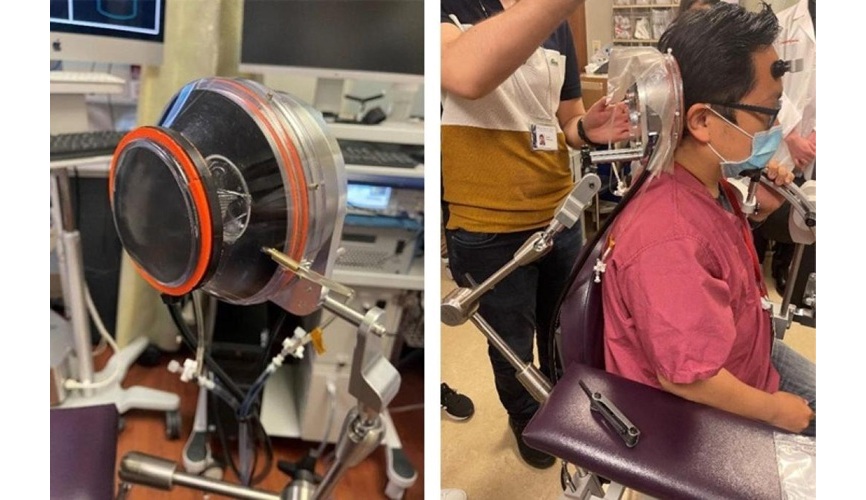AI Trained for Specific Vocal Biomarkers Could Accurately Predict Coronary Artery Disease
|
By HospiMedica International staff writers Posted on 28 Mar 2022 |

Earlier studies have examined the use of voice analysis for identifying voice markers associated with coronary artery disease (CAD) and heart failure. Other research groups have explored the use of similar technology for a range of disorders, including Parkinson’s disease, Alzheimer’s disease and COVID-19. Now, for the first time, researchers have used voice analysis to predict CAD outcomes in patients who were tracked prospectively after an initial screening.
In a recent study by the research team at Mayo Clinic (Rochester, MN, USA), an artificial intelligence (AI)-based computer algorithm accurately predicted a person’s likelihood of suffering from CAD based on voice recordings alone. The researchers found that people with a high voice biomarker score were 2.6 times more likely to suffer major problems associated with CAD and three times more likely to show evidence of plaque buildup in medical tests compared with those who had a low score. While the technology is not yet ready for use in the clinic, the demonstration suggests voice analysis could be a powerful screening tool in identifying patients who may benefit from closer monitoring for CAD-related events. Researchers beleive this approach could be particularly useful in remote health care delivery and telehealth.
For the new study, researchers recruited 108 patients who were referred for a coronary angiogram, an X-ray imaging procedure used to assess the condition of the heart’s arteries. Participants were asked to record three 30-second voice samples using the Vocalis Health smartphone application. For the first sample, participants read from a prepared text. For the second sample, they were asked to speak freely about a positive experience, and for the third, they spoke freely about a negative experience.
The Vocalis Health algorithm then analyzed participants’ voice samples. The AI-based system had been trained to analyze more than 80 features of voice recordings, such as frequency, amplitude, pitch and cadence, based on a training set of over 10,000 voice samples. In previous studies, researchers had identified six features that were highly correlated with CAD. For the new study, researchers combined these features into a single score, expressed as a number between -1 and 1 for each individual. One-third of patients were categorized as having a high score and two-thirds had a low score.
Study participants were tracked for two years. Of those with a high voice biomarker score, 58.3% visited the hospital for chest pain or suffered acute coronary syndrome (a type of major heart problem that includes heart attacks), the study’s composite primary endpoint, compared with 30.6% of those with a low voice biomarker score. Participants with a high voice biomarker score were also more likely to have a positive stress test or be diagnosed with CAD during a subsequent angiogram (the composite secondary endpoint).
The researchers have not concluded why certain voice features seem to be indicative of CAD, but believe that the autonomic nervous system may play a role. This part of the nervous system regulates bodily functions that are not under conscious control, which includes both the voice box and many aspects of the cardiovascular system, such as heart rate and blood pressure. Therefore, it is possible that the voice could provide clues about how the autonomic nervous system is functioning, and by extension, provide insights into cardiovascular health, according to the researchers.
“We can’t hear these particular features ourselves. This technology is using machine learning to quantify something that isn’t easily quantifiable for us using our human brains and our human ears,” said Jaskanwal Deep Singh Sara, MD, a cardiology fellow at Mayo Clinic and the study’s lead author. “We’re not suggesting that voice analysis technology would replace doctors or replace existing methods of health care delivery, but we think there’s a huge opportunity for voice technology to act as an adjunct to existing strategies.”
Related Links:
Mayo Clinic
Channels
Critical Care
view channel
Focused Ultrasound Technique Successfully Treats Pediatric Brain Cancer
Treating brain cancer in children remains one of the most difficult challenges in medicine, largely because most chemotherapy drugs cannot reach tumors deep inside the brain. A key obstacle is the blood-brain... Read more
Nasal Drops Fight Brain Tumors Noninvasively
Glioblastoma is one of the most aggressive and fatal brain cancers, progressing rapidly and leaving patients with very limited treatment options. A major challenge has been delivering effective therapies... Read more
AI Helps Optimize Therapy Selection and Dosing for Septic Shock
Septic shock is a life-threatening complication of sepsis and remains a leading cause of hospital deaths worldwide. Patients experience dangerously low blood pressure that can rapidly lead to organ failure,... Read more
Glowing Bacteria ‘Pills’ for Detecting Gut Diseases Could Eliminate Colonoscopies
Diagnosing gastrointestinal diseases such as colitis and colorectal cancer often relies on colonoscopy, an invasive procedure that many patients avoid despite ongoing symptoms like bleeding, cramping, and diarrhoea.... Read moreSurgical Techniques
view channelLaparoscopic Surgery Improves Outcomes for Severe Newborn Liver Disease
Biliary atresia is a rare but life-threatening liver condition in newborns that blocks bile flow and leads to progressive liver damage if not treated early. Surgery is typically performed within the first... Read moreNovel Endoscopy Technique Provides Access to Deep Lung Tumors
Detecting lung cancer early can save lives, but diagnosing small tumors deep in the outer regions of the lungs remains a major clinical challenge. Although CT scans frequently identify tiny suspicious... Read morePatient Care
view channel
Revolutionary Automatic IV-Line Flushing Device to Enhance Infusion Care
More than 80% of in-hospital patients receive intravenous (IV) therapy. Every dose of IV medicine delivered in a small volume (<250 mL) infusion bag should be followed by subsequent flushing to ensure... Read more
VR Training Tool Combats Contamination of Portable Medical Equipment
Healthcare-associated infections (HAIs) impact one in every 31 patients, cause nearly 100,000 deaths each year, and cost USD 28.4 billion in direct medical expenses. Notably, up to 75% of these infections... Read more
Portable Biosensor Platform to Reduce Hospital-Acquired Infections
Approximately 4 million patients in the European Union acquire healthcare-associated infections (HAIs) or nosocomial infections each year, with around 37,000 deaths directly resulting from these infections,... Read moreFirst-Of-Its-Kind Portable Germicidal Light Technology Disinfects High-Touch Clinical Surfaces in Seconds
Reducing healthcare-acquired infections (HAIs) remains a pressing issue within global healthcare systems. In the United States alone, 1.7 million patients contract HAIs annually, leading to approximately... Read moreBusiness
view channel
Philips and Masimo Partner to Advance Patient Monitoring Measurement Technologies
Royal Philips (Amsterdam, Netherlands) and Masimo (Irvine, California, USA) have renewed their multi-year strategic collaboration, combining Philips’ expertise in patient monitoring with Masimo’s noninvasive... Read more
B. Braun Acquires Digital Microsurgery Company True Digital Surgery
The high-end microsurgery market in neurosurgery, spine, and ENT is undergoing a significant transformation. Traditional analog microscopes are giving way to digital exoscopes, which provide improved visualization,... Read more
CMEF 2025 to Promote Holistic and High-Quality Development of Medical and Health Industry
The 92nd China International Medical Equipment Fair (CMEF 2025) Autumn Exhibition is scheduled to be held from September 26 to 29 at the China Import and Export Fair Complex (Canton Fair Complex) in Guangzhou.... Read more













